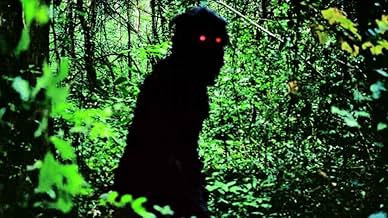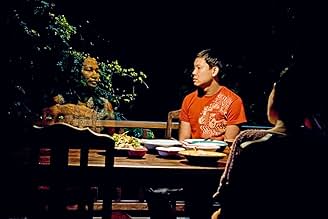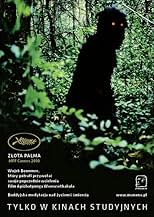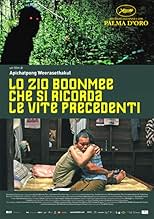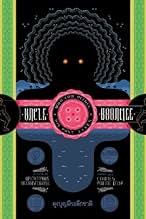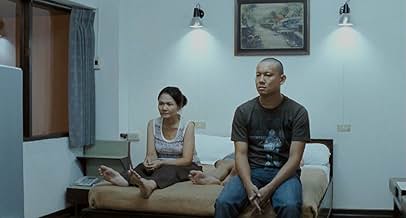Uncle Boonmee Who Can Recall His Past Lives
Original title: Loong Boonmee raleuk chat
IMDb RATING
6.7/10
18K
YOUR RATING
Dying of kidney disease, a man spends his last, somber days with family, including the ghost of his wife and a forest spirit who used to be his son, on a rural northern Thailand farm.Dying of kidney disease, a man spends his last, somber days with family, including the ghost of his wife and a forest spirit who used to be his son, on a rural northern Thailand farm.Dying of kidney disease, a man spends his last, somber days with family, including the ghost of his wife and a forest spirit who used to be his son, on a rural northern Thailand farm.
- Awards
- 11 wins & 25 nominations
Kanokporn Tongaram
- Roong
- (as Kanokporn Thongaram)
- …
- Director
- Writers
- All cast & crew
- Production, box office & more at IMDbPro
Storyline
Did you know
- TriviaShot on 16mm film rather than digital. Director Apichatpong Weerasethakul wanted to film in this format as the film is all about dying traditions.
- GoofsThe first time a ghost appears, during dinner, the nephew passes the ghost a glass of water. You can see the ghost image superimposed over the nephew's arm when he places the glass of water on the table.
- ConnectionsFeatured in At the Movies: Cannes Film Festival 2010 (2010)
Featured review
For those who have not heard of Thai filmmaker and artist Apichatpong Weerasethakul, I guess you must have heard of his latest film Uncle Boonmee Who Can Recall His Past Lives, winning the Palme d'Or at last year's Cannes Film Festival, and being the first Southeast Asian director to do so. That should interest you to take that leap of faith to experience the coming of Uncle Boonmee yourself, and that feeling of being frustrated yet enthralled, fascinated yet perplexed, all at the same time, fighting to stay engaged, and making sense of the visuals flitting around dreamscapes.
This film is like a diamond with many different cuts made to make it shine, each representing a facet from which you can choose to look at, or interpret from. Like a prism which dissipates light shone on it, your take on this film will likely be entirely different from mine, and what more, you'll probably have different takes on each of the different aspects of the film, since the scenes that make it up are as disparate as can be. It makes the film going experience a little more interesting since it's open, and never crystal clear given the takeaways for one based on one's journey in life thus far.
At its crux, the story is exactly that of its title, where we see Uncle Boonmee (Thanapat Saisaymar) living the last days of his life with kidney failure, choosing like most Asians do with the preference to live out the last days at the comfort of one's home, rather than at a sterile hospital. It is said that those on the death bed will see their life flash pass their eyes, but for Uncle Boonmee, his plodding walk toward the light at the end of the tunnel, means giving the film a lot more exploratory path to tread on, with a look at what his past lives were as well, ranging from the suggested buffalo, to even a member of the aristocracy (and that much talked about scene with the catfish. Hmm... maybe he could be the catfish too!)
Things get a lot stranger of course, even as it seems that Boonmee can remember his previous lives before reincarnation. As far as my limited grasp of that process goes, one has to drink up a liquid that will make you forget what you've gone through, and one's karma accumulation has bearings on what next you'll be incarnated, with the human form being quite OK, rather than an animal. I suppose Boonmee in his previous life did OK to be reincarnated as a human in this life, and in his last days get visited by his late wife (Natthakarn Aphaiwonk) with whom he shares a poignant, heart-wrenching scene with, and also a visit from his son (Geerasak Kulhong behind heavy makeup), whom you'd have already have an idea of from the various promotional material, and no, he's not captured in a picture just because the camera did not have an anti-red eye function.
Don't be shy if you don't understand the film. For starters, I suppose any film based on dreams and fantasy opens itself up to a lot of leeway in interpretation, and not taking everything verbatim, verbose or literal. Even the auteur himself has said that you "don't need to understand everything" in an interview with The Guardian, probably a relief for those like me who emerged from the screening with more questions than to know where to begin asking them. Like most art films, this one moves at a leisurely pace, and is filled with plenty of art house sensibilities and techniques, and while I won't say will reward the patient viewer, it will challenge you to think through about what you've just seen, and I felt it was easier to make sense of individual scenes, than as a whole when trying to fit the jigsaw in a coherent fashion.
To paraphrase Bruce Lee, this film is like water, having no form of its own, yet taking up form based on the viewer's individual experience and interpretation. I guess that's what makes Uncle Boonmee unique, coming from a filmmaker who's bold to conceptualize this piece of art that works itself through different strokes for different folks.
This film is like a diamond with many different cuts made to make it shine, each representing a facet from which you can choose to look at, or interpret from. Like a prism which dissipates light shone on it, your take on this film will likely be entirely different from mine, and what more, you'll probably have different takes on each of the different aspects of the film, since the scenes that make it up are as disparate as can be. It makes the film going experience a little more interesting since it's open, and never crystal clear given the takeaways for one based on one's journey in life thus far.
At its crux, the story is exactly that of its title, where we see Uncle Boonmee (Thanapat Saisaymar) living the last days of his life with kidney failure, choosing like most Asians do with the preference to live out the last days at the comfort of one's home, rather than at a sterile hospital. It is said that those on the death bed will see their life flash pass their eyes, but for Uncle Boonmee, his plodding walk toward the light at the end of the tunnel, means giving the film a lot more exploratory path to tread on, with a look at what his past lives were as well, ranging from the suggested buffalo, to even a member of the aristocracy (and that much talked about scene with the catfish. Hmm... maybe he could be the catfish too!)
Things get a lot stranger of course, even as it seems that Boonmee can remember his previous lives before reincarnation. As far as my limited grasp of that process goes, one has to drink up a liquid that will make you forget what you've gone through, and one's karma accumulation has bearings on what next you'll be incarnated, with the human form being quite OK, rather than an animal. I suppose Boonmee in his previous life did OK to be reincarnated as a human in this life, and in his last days get visited by his late wife (Natthakarn Aphaiwonk) with whom he shares a poignant, heart-wrenching scene with, and also a visit from his son (Geerasak Kulhong behind heavy makeup), whom you'd have already have an idea of from the various promotional material, and no, he's not captured in a picture just because the camera did not have an anti-red eye function.
Don't be shy if you don't understand the film. For starters, I suppose any film based on dreams and fantasy opens itself up to a lot of leeway in interpretation, and not taking everything verbatim, verbose or literal. Even the auteur himself has said that you "don't need to understand everything" in an interview with The Guardian, probably a relief for those like me who emerged from the screening with more questions than to know where to begin asking them. Like most art films, this one moves at a leisurely pace, and is filled with plenty of art house sensibilities and techniques, and while I won't say will reward the patient viewer, it will challenge you to think through about what you've just seen, and I felt it was easier to make sense of individual scenes, than as a whole when trying to fit the jigsaw in a coherent fashion.
To paraphrase Bruce Lee, this film is like water, having no form of its own, yet taking up form based on the viewer's individual experience and interpretation. I guess that's what makes Uncle Boonmee unique, coming from a filmmaker who's bold to conceptualize this piece of art that works itself through different strokes for different folks.
- DICK STEEL
- Jan 16, 2011
- Permalink
- How long is Uncle Boonmee Who Can Recall His Past Lives?Powered by Alexa
Details
- Release date
- Countries of origin
- Official sites
- Languages
- Also known as
- Bác Boonmee
- Filming locations
- Production companies
- See more company credits at IMDbPro
Box office
- Gross US & Canada
- $184,292
- Opening weekend US & Canada
- $23,540
- Mar 6, 2011
- Gross worldwide
- $1,214,424
- Runtime1 hour 54 minutes
- Color
- Sound mix
- Aspect ratio
- 1.85 : 1
Contribute to this page
Suggest an edit or add missing content

Top Gap
What is the Hindi language plot outline for Uncle Boonmee Who Can Recall His Past Lives (2010)?
Answer

